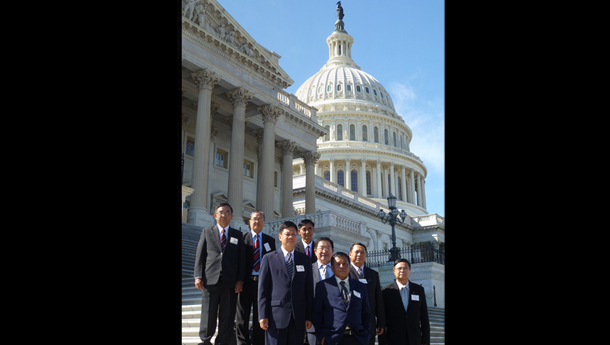WASHINGTON DC—A multi-party delegation of Burmese parliamentarians, who were given a glimpse into the working of the US Congress and State legislatures this past week, say they have gone back to Burma having learned lessons which they would like to implement in their own nascent democracy.
Head of the delegation, T. Khun Myatt, who is chairman of the Bill Committee in Naypyidaw, said that the delegation will prepare and submit a report on their US visit to the Burmese parliament, in which they are expected to include aspects of the US Congress that could be incorporated into Burma’s system.
“We will let every parliamentarian know how the world is changing and how we can reform and change our country,” he said, adding that the delegation met several top American senators and had meetings with several congressional committees. “Democracy in the US,” he said, “is fully established.”
Khun said the democratic reforms in Burma are now irreversible. “It is a common desire of all parliamentarians to enact reforms,” he said.
During his interaction with US lawmakers, Khun said he and other members of the delegation asked them to help remove the remaining restrictions and sanctions on Burma. He said he hoped that this would soon be done.
The Burmese delegation included four parliamentarians each from the Upper and Lower Houses. The delegates from the Pyithu Hluttaw (Lower House) were: T. Khun Myat, the chairman of the Bill Committee; Maung Toe, the secretary of the Public Accounts Committee; Stephen, a member of the Bill Committee; and Zaw Myint Maung, a member of the Rule of Law, Peace and Stability Committee.
Representing the Amyotha Hluttaw (Upper House) were: Tin Mya, a member of parliament; Hla Tun, a military representative on the Bill Drafting Committee; Steven Tha Bik, a member of the Public Accounts Committee; and Htun Kyaw, a member of the Government Guarantee, Pledges and Venture Vetting Committee.
“We have had lot of meetings to learn about how the Congress in the US carries out its function,” Dr Zaw Mying Maung, an NLD MP, told The Irrawaddy. The most impressive part of the US Congress, he said, is that lawmakers have highly educated, highly trained staff who play an important role in the running of the Congress.
The delegation also travelled to Annapolis in Maryland to discuss state-level policy and its relationship with the federal government. They also met with committee staffers from Maryland’s Committee on Federal Relations, and with budget analysts to discuss how states distribute and manage funds. Burma too has state assemblies that must negotiate their relationships with the central government.
“Since 2010, the Union of Myanmar is undergoing a dramatic transition from a relatively isolated economy and a political system dominated by a military junta to an emerging democracy that is pursuing wide ranging economic and political reforms,” said Karl Jackson, a director at Johns Hopkins School of Advanced International Studies (SAIS), which oversaw the training sessions for the delegates as they participated in a variety of lectures, roundtable discussions and events.
“However, institutional knowledge of legislative systems remains extremely limited. The goal of this program is to expose the delegation to numerous aspects of the US system of governance, and how non-government entities interact within it, and discuss how this applies to Myanmar’s own political development,” Jackson said.
















